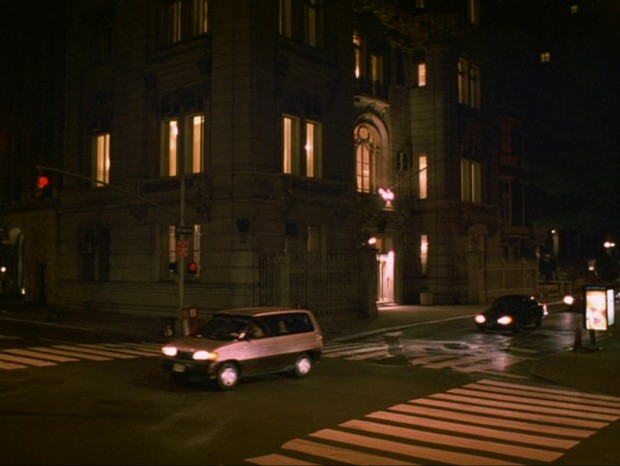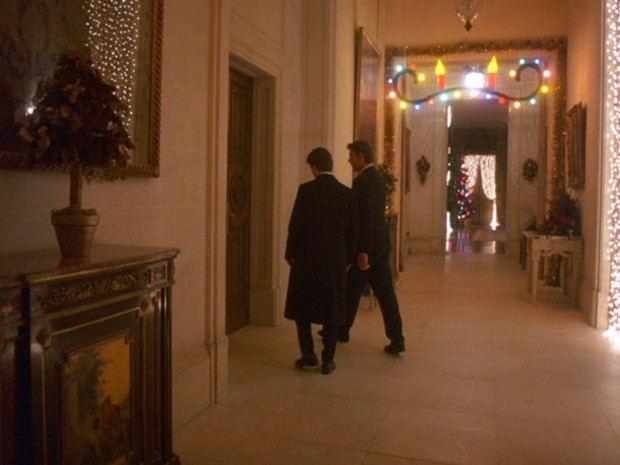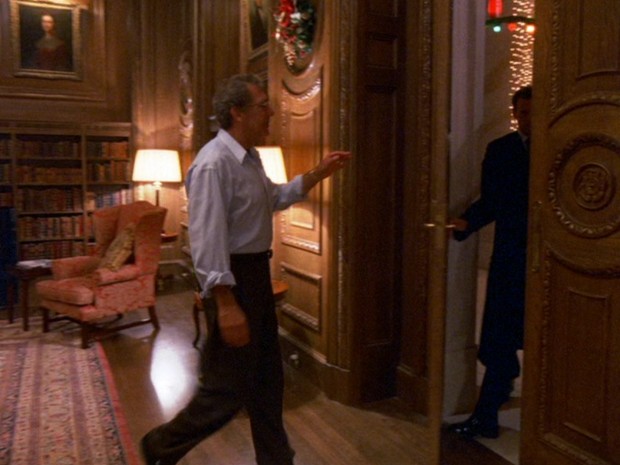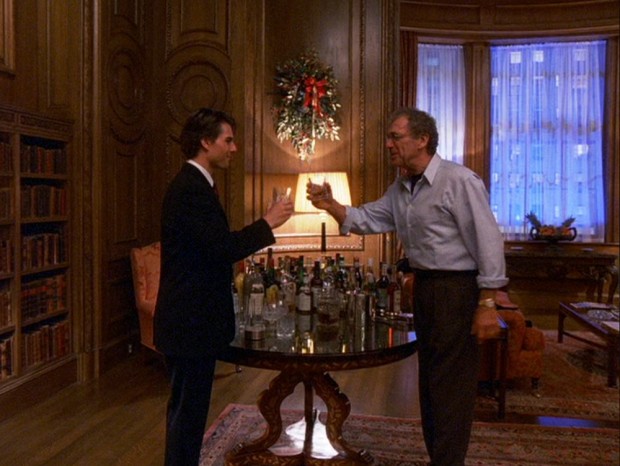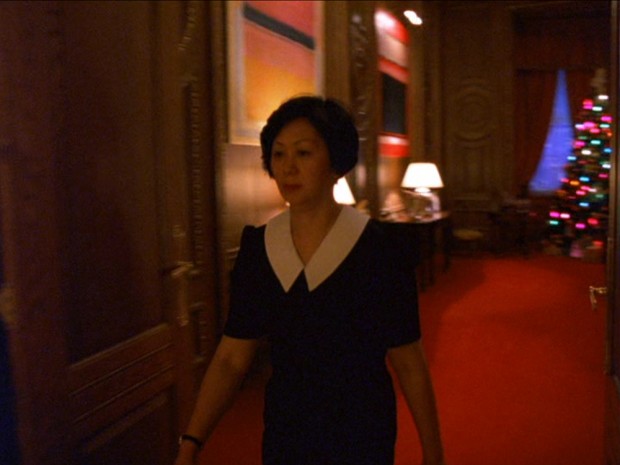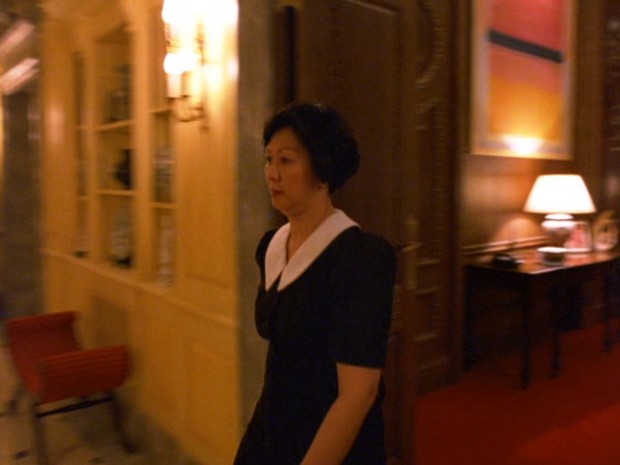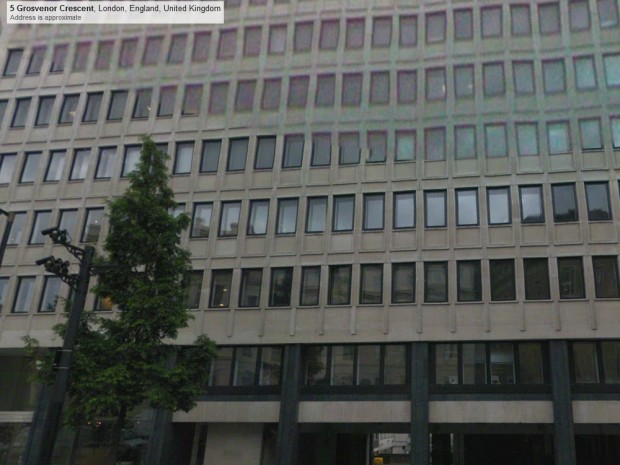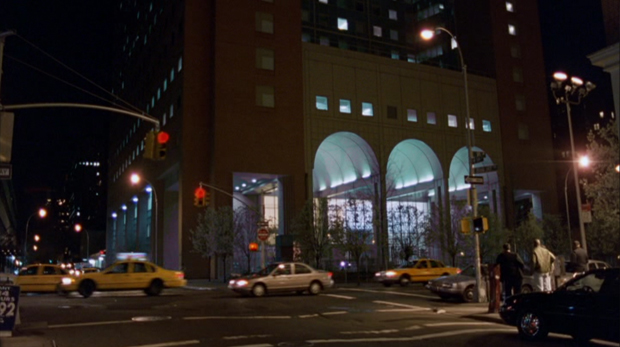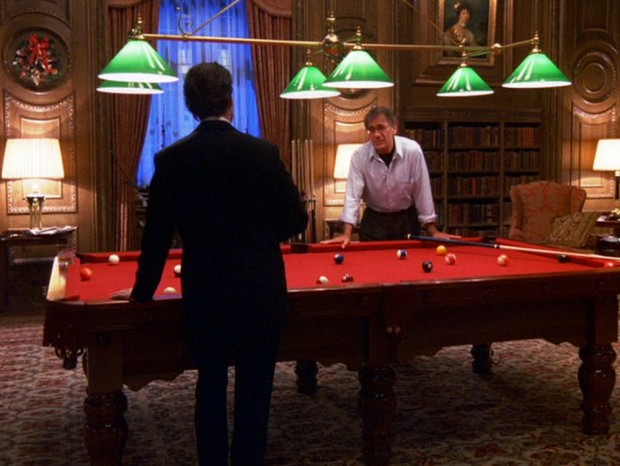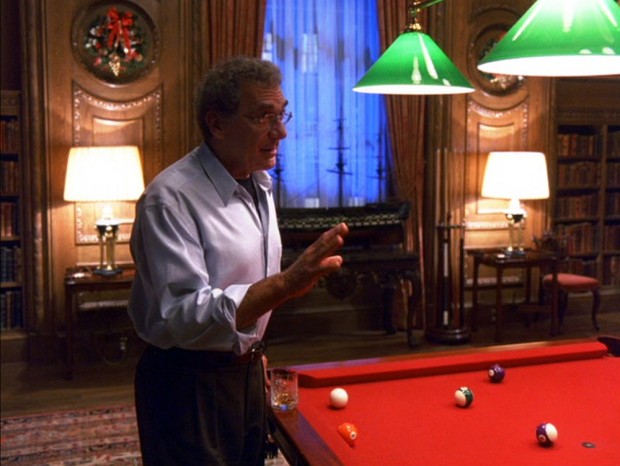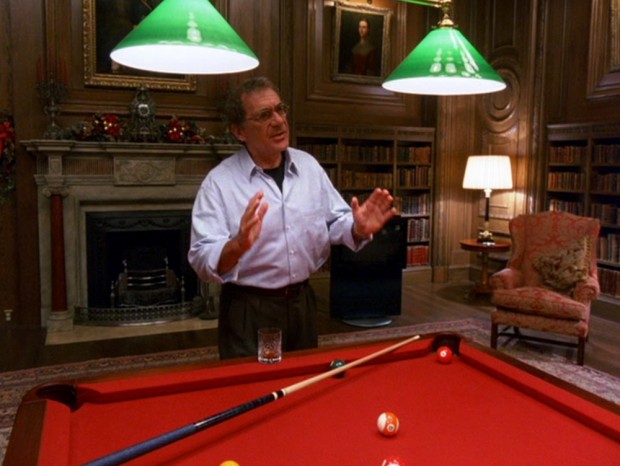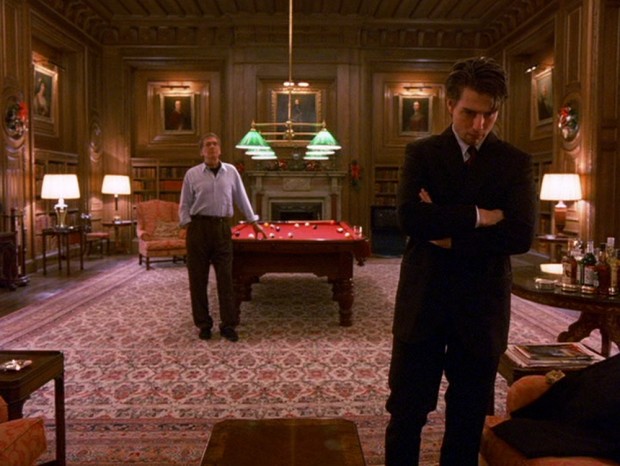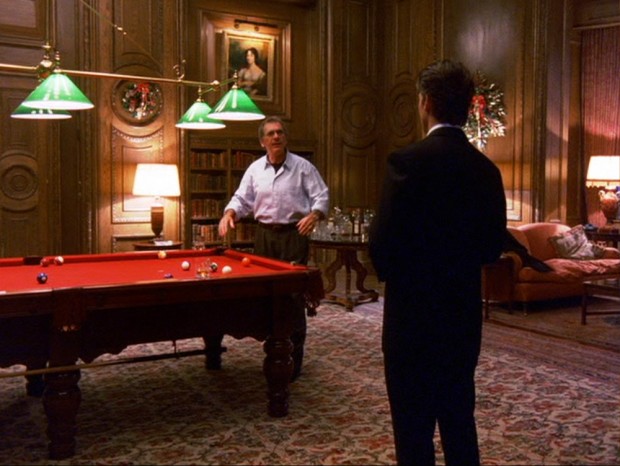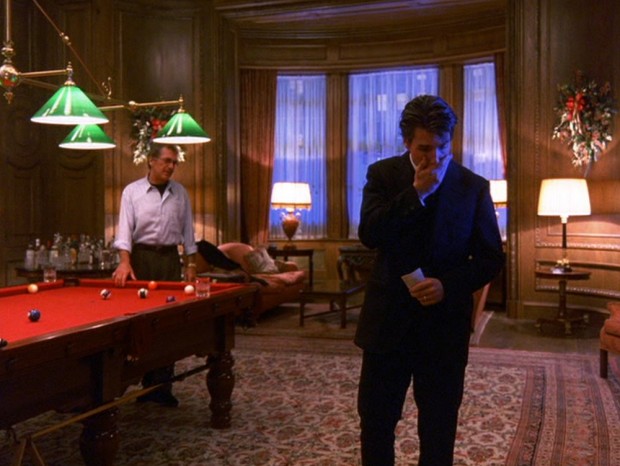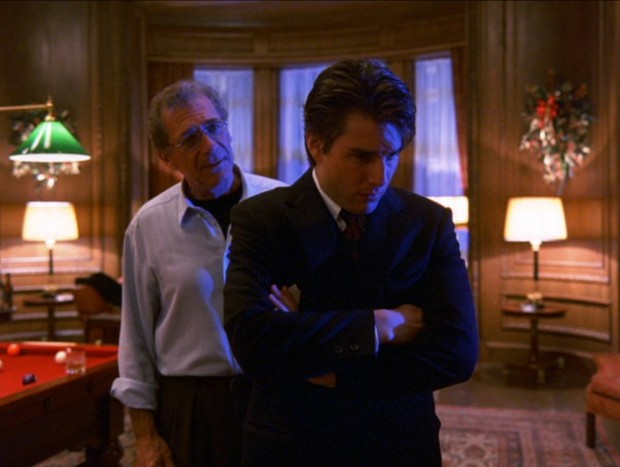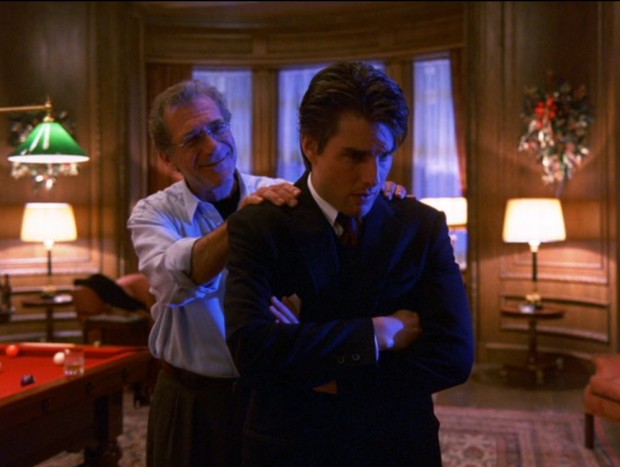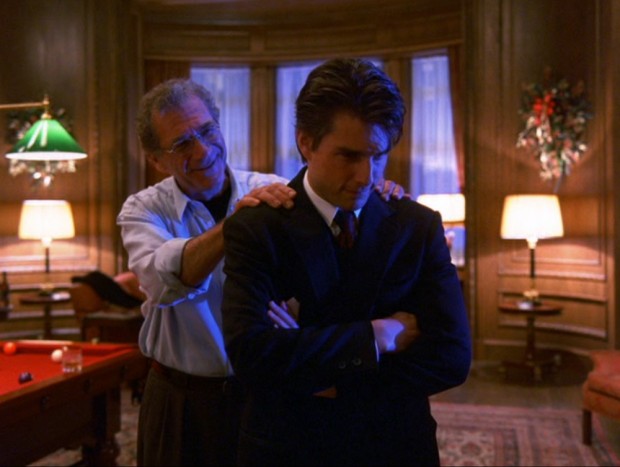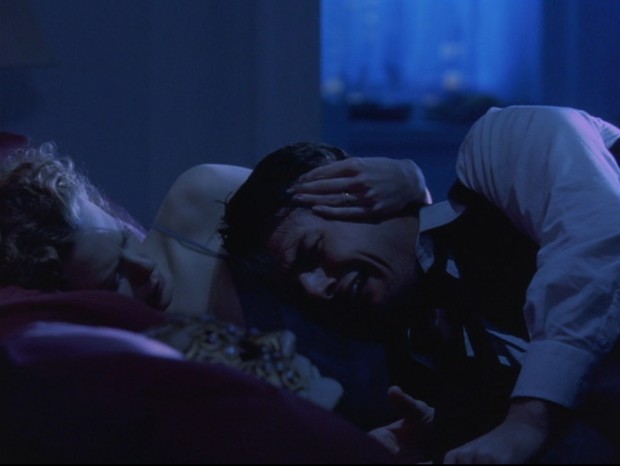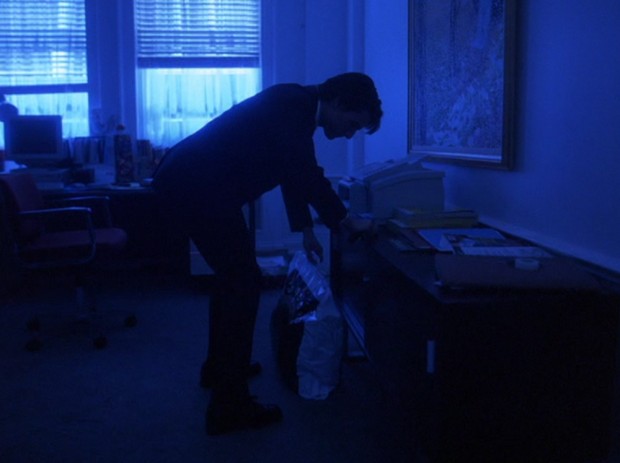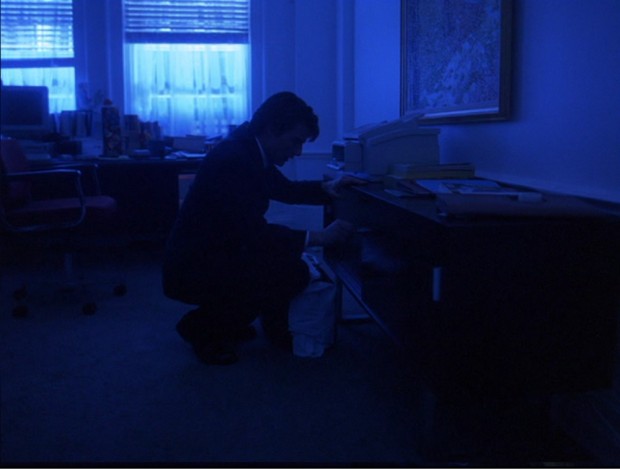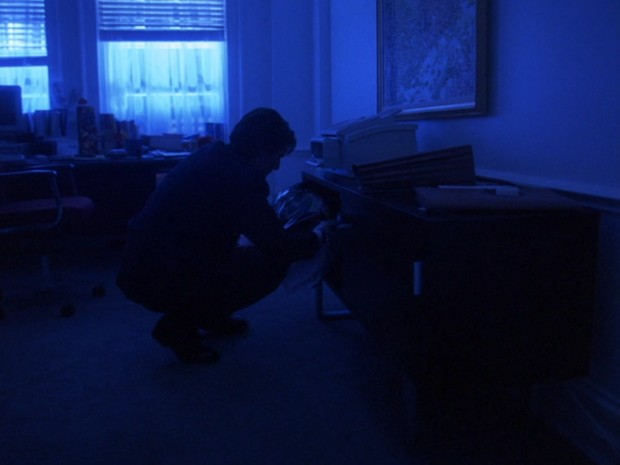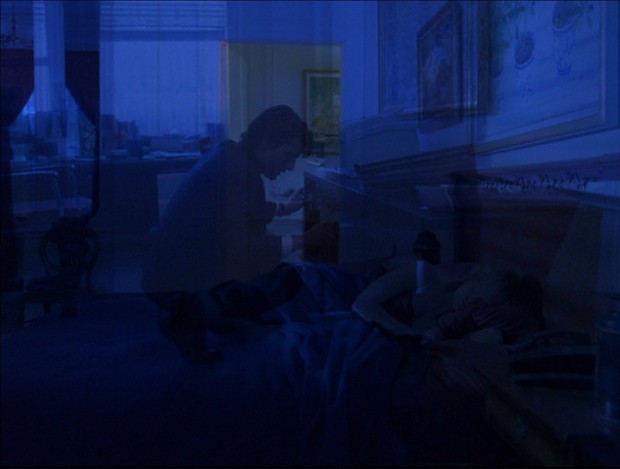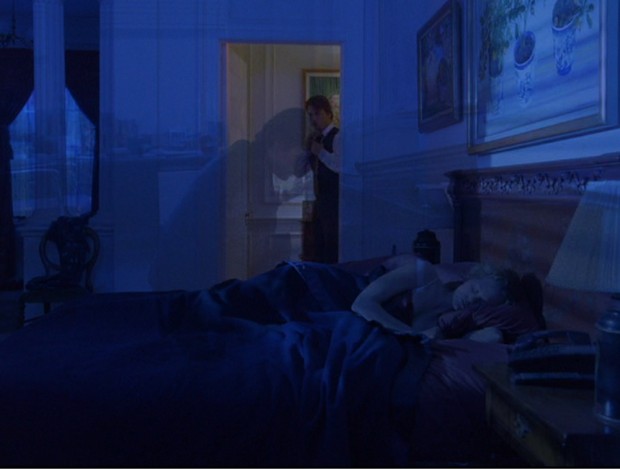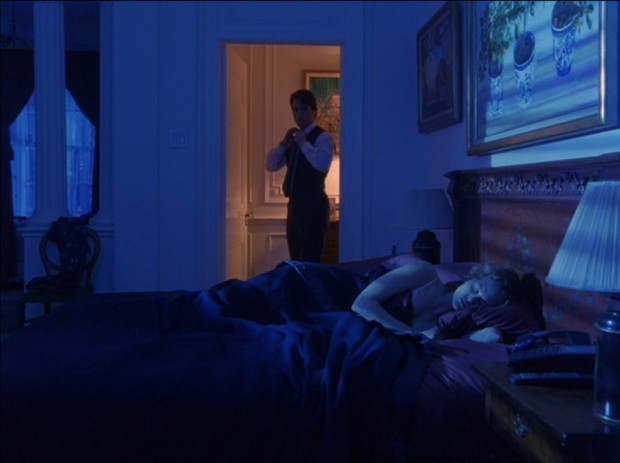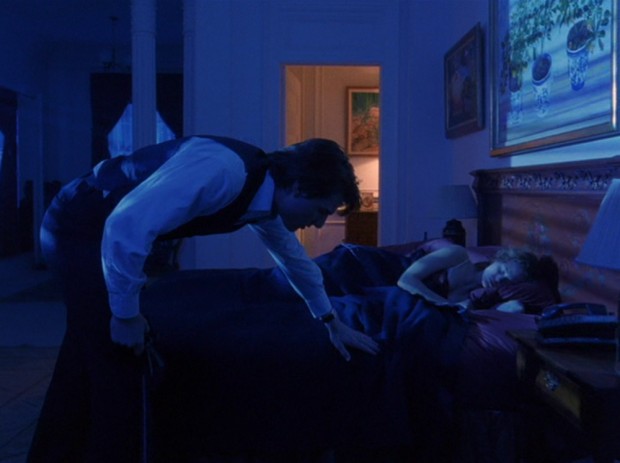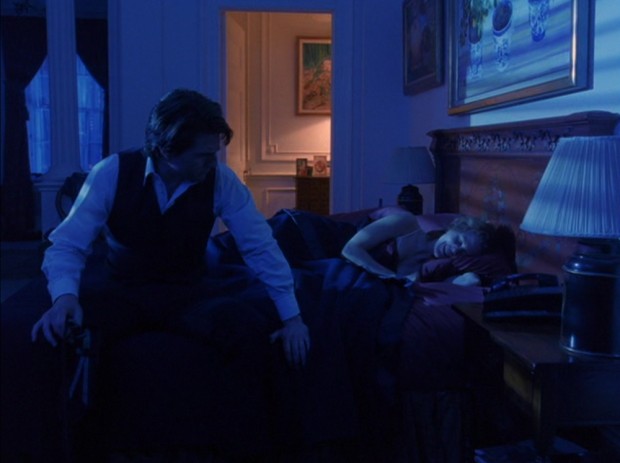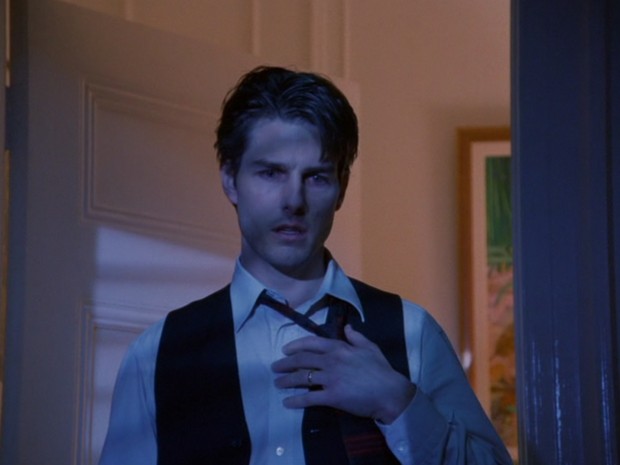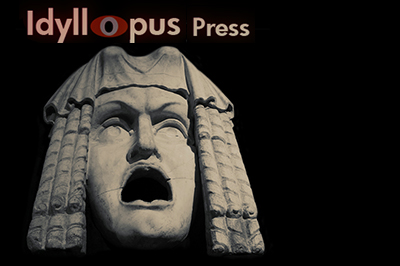STANLEY KUBRICK'S EYES WIDE SHUT

Go to TOC for this film ( (which has also a statement on purpose and manner of analysis and a disclaimer as to caveat emptor and my knowing anything authoritatively, which I do not, but I do try to not know earnestly, with some discretion, and considerable thought).
PART EIGHT
TOC and Supplemental Posts | Part 1 | Part 2 | Part 3 | Part 4 | Part 5 | Part 6 | Part 7 | Part 8 | Part 9 | Films Home
LINKS TO SECTIONS OF THE ANALYSIS ON THIS PAGE:
Return to Ziegler's Mansion, Shots 499 through 555
The billiards/pool room and its relationship to the Lou Nathanson household. The problem of Victor's knowledge of the locked apartment.
Unmasked, Shots 556 through 567
The mask on the pillow and how it comes to be there through the spatial/psychic logic of the film. Bill and Alice's apartment and the shifting position of the bedroom.
RETURN TO ZIEGLER'S MANSION
THE BILLIARDS/POOL ROOM AND ITS RELATIONSHIP TO THE LOU NATHANSON HOUSEHOLD - THE PROBLEM OF VICTOR'S KNOWLEDGE OF THE LOCKED APARTMENT
SKIP ALL THIS AND TAKE ME TO THE TL;DR WRAP-UP AT THE END OF THE PAGE.
499 LS Exterior of Ziegler's mansion. (2:10:25)
At the beginning of the film, in the shot of the exterior prior the party, the traffic had been traveling on Madison Avenue. Now it is traveling on East 37th Street.
Ziegler's mansion is adjacent 237 Madison Ave, the 237 possibly not coincidental but recalls the mysterious suite in The Shining where Jack and Danny had their confrontations. Well, no doubt relating the Ziegler mansion to room 237 and the Verona restaurant as well (street number 237), before which Bill had his confrontation with the bald man, and which also doubled as the Jaso(n) Hotel.
500 MS Ziegler's assistant leading Bill down the hall. (2:10:28)
It is the hall Alice and Bill passed down before entering the room with the grand staircase, just as here the assistant and Bill pass through that room and the grand staircase.
The disparity in height between Bill and Victor's butler is here either not avoided or is accentuated, so the butler appears to be near a giant in comparison to Bill.
The decorations are still up in the grand stairway room, but only the Christmas tree and the cascade of white lights are lit. As they continue down the hall that leads to the ball room, we see the same style of bow decorations as had been at Sharky's (which was also the Rainbow costume shop).
Considering that we are about to enter Victor's pool/billiards room, Sharky's could perhaps reference a pool shark, the pool room merging with the coffee shop.
A pool shark is a hustler. From Wikipedia, "Verb: To perform some act or make some utterance with the intent to distract, irritate or intimidate the opponent so that they do not perform well, miss a shot, etc."
If we go back to the beginning of the film I had postulated that the opening music, having been for a film titled The First Echelon, may have brought into Eyes Wide Shut what "first echelon" means.
Quoting myself, "...a type of deep battle Russian theory of warfare in which the defense would be confused by diversionary, multiple parallel and successive operations, the tactical aim being to leave the object of these campaigns unable to conclude and focus on what is the main objective. The way Kubrick tailors his choice of music for a film, the title and history often informative, I would suggest that one of his reasons for using this piece was due this deep battle theory, Bill under siege of various confrontations and dilemmas which he at first views as unrelated and coincidental, then paranoia setting in over a perceived unity of purpose behind at least some of the events, followed by even more bewilderment as the ground under him shifts yet again, his fears and beliefs simultaneously confirmed and denied in such a way that he is completely undone when he faces the "mask" in its ultimate revelation, the Bill he was only a couple of days prior suddenly and forever gone, along with his former world paradigm.
However, not only is Bill under siege with diversionary, multiple parallel and successive operations, so is the audience member watching the film.
Magic is all about misdirection. In the closing scene of the film we observe the board game "Magic Circle". The question then has Bill been misdirected? Or has the audience been misdirected? And how might this be and to what aim? Is it a statement on the nature of life? Is it a statement on Kubrick's process? Is it all of these things?
We've been given subtle clues all along as to misdirection regarding the set having been used repeatedly for different street scenes. We know that it wasn't cheapness or laziness in set design that caused us to see in Rainbow Fashion's windows a reflection of the street from which Bill has taken a taxi to get there; the reflections were there with intent and were a clue for the audience. You've been here before. Bill has been here before. This is right across the street from where he was.
Bill is ushered through a left door into Ziegler's pool room/library which is lined with books, reminding somewhat of the library at Somerset.
501 LS Victor in the library/billiard room. (2:10:44)
VICTOR: Come in!
Leaving the pool table, Victor reaches the door as it opens, his butler showing in Bill but remaining outside. We have a brief glimpse of the hall which is staged to look like that of Lutton Hoo but is not.
Closing the door, Ziegler greets Bill warmly.
With the large speaker in the background, Kubrick may be referencing A Clockwork Orange and the scene with the billiards table, in which the writer, Alexander, sits behind it, between two large speakers broadcasting Beethoven, orchestrating the predetermined suicide attempt of Alex in the room above, Alex, unable to tolerate Beethoven due his programming, incapable of committing violence, still manages to throw himself out the window.
VICTOR: Bill, I appreciate you coming.
BILL: Sure.
VICTOR: Sorry to drag you out here tonight. Let me have your coat.
BILL (letting him take his coat): No, no, no. I was out anyway. Thank you.
VICTOR: How about a drink. (He slaps Bill's shoulder.)
BILL: Are you having one?
VICTOR: Sure.
BILL: Okay.
VICTOR: What would you like?
BILL: Just a little scotch.
Victor tosses Bill's coat on a sofa and gets his drink from a table stocked with dozens of bottles.
VICTOR: Good. How do you take it? Neat?
BILL: Please. Was a terrific party the other night. Alice and I had a wonderful time.
VICTOR: Well, good, good. (Hands him the drink.) It was great seeing you both. Cheers. (They clink glasses.)
As can be seen in the image below, the woodwork at Victor's is the same as briefly observed at the Nathanson residence when Rosa answers the door for Bill. Note, too, how the Nathanson residence has in that room a red carpet that recalls the red felt of the billiard table.
We see at least one Mark Rothko painting on the left. The painting on the right possibly is but I've not identified it.
This is not a cut-away shot when the maid exits the room. She exits it directly into the Nathanson entry.
I've repeatedly read that the billiards scene was filmed in the Royal Suite of the Lanesborough Hotel (once a hospital) in London, the Royal Suite being so exclusive that it's located in a secret location in the hotel that isn't even known but to a few of the hotel's employees.
The Royal Suite of the Lanesborough, 1 Lanesborough Place, SW1, was the site of the edge pool-game meeting between Bill and Ziegler.
Source: Movielocations.com
Of at least five London locations, the royal suite at the Lanesborough Hotel at Hyde Park Corner was hired for 10 days in November 1996. Immediately afterwards, the production moved to the Soho drag club, Madame JoJo's.
Source: July 3, 1988 article in the Guardian U.K. "How I tracked down Stanley Kubrick"
The hotel's Royal Suite was used for the fraught over a game of pool meeting between Bill Harford (Tom Cruise) and Victor Ziegler (Sydney Pollack) in Stanley Kubrick's Eyes Wide Shut.
Source: Movielondon.net
Stanley Kubrick's 1999 thriller Eyes Wide Shut used The Lanesborough's most expensive suite, The Royal Suite, as Victor Ziegler's snooker room in the film's pseudo-denouement scene. Bill (Tom Cruise) is summoned by Ziegler (Sydney Pollack) to his home where the two circle his red pool table while the mysterious millionaire gives his explanation of the previous night's events, which included the film's famous masked orgy scenes. The Royal Suite is said to cost up to 8,000 per night, for which you get three bedrooms, a drawing room, study, kitchen, 24-hour butler service, and a chauffeur driven Bentley for the evening.
Source: ehotelier.com
The Royal Suite of the Lanesborough reputedly has floor to ceiling windows facing Buckingham Gardens. I've seen two photos said to be of the Lanesborough Royal Suite, one a sitting room and the other a bedroom (I've yet to see anything remotely similar to the pool room in Eyes Wide Shut) and both have floor to ceiling windows, which Victor's pool room does not. The pool room is a corner room with two windows, the one beyond the sofas and the one seen behind a ship model. If one takes a look at the Lanesborough's surroundings in Googlemaps, there is but one building which could possibly provide a view of a building with close windows. That building is one facing Grosvenor Crescent and Duke of Wellington Place.
The style of windows of the above building--one pane of glass--doesn't match any of those viewed out the two windows in the supposed corner room of the supposed Lanesborough Royal Suite room used for a pool room. And, besides, the Lanesborough does not, as far as I can tell, appear to have a corner room that faces out on two close set neighboring buildings from which such windows could be viewed as observed in the shots from the pool room.
IMDB has the lore this pool room scene took three weeks to shoot, but the 1998 Guardian article states that the Royal Suite was booked for 10 days.
To further add to the confusion, Londontown.com gives the Royal Suite's Junior Bedroom as being where Bill and Alice's bedroom was filmed. This can't be so as the Royal Suite was said to have been booked only 10 days and we have a number of scenes in Alice and Bill's bedroom: the long conversation with Alice and Bill in the bedroom when they're high; the dressing room scenes; the scene after the initial party at Victor's; the long scene when Bill comes home from the "orgy"; the scene when he returns home from this last discussion with Victor. But perhaps this bit of lore exists for a reason as it ties Bill and Alice's bedroom with Victor's home and with the Nathanson home. And, as we shall shortly see, Bill and Alice's bedroom does not map into their apartment. It is one of those Kubrick rooms that is impossible, and Kubrick even presents the impossible room as being in two different locations in the apartment.
I find in an interview that Jan Harlan states, "Stanley Kubrick changed his mind on the two sets that involved the character of Ziegler. Originally he had selected two locations for the bathroom scene and the scene around the pool table with Tom Cruise. But he changed his mind as he didn't like what he had chosen and this was his prerogative. We had to build sets which took several weeks to finish and I couldn't make a deal with Harvey Keitel's agent that we could live with. End of story. Stanley was delighted to get Sydney Pollack at a later date when the sets were built. There was just one scene we had to re-shoot: the reception at the Ziegler's Christmas party."
This leads me to think that Kubrick didn't like what was shot during those 10 days at the Royal Suite, that a set was built for the billiards room, and that woodwork from that set was also used for the Nathanson apartment.
Even though it seems the billiard room scene was not ultimately shot at the Lanesborough, the film itself even seems to present a connection between not only the Nathanson apartment and the billiard room, but the Lanesborough. When Bill is on his way to the Nathanson's in the cab we see FIRE LANE on the street in such a way that LANE is the word that makes a most lasting impression in the shot.
The place is 5th and Broadway, approaching the Flatiron Building at 23rd street. What is unique about the architecture of the Flatiron building is that it forms a triangle, the distinctive wedge forced by Broadway and 5th not being parallel. Broadway and 5th continue in their not parallel way until 17th Street, where we have Union Square Park for a few blocks and Broadway appears to become Union Square West (or so it seems) which runs parallel 5th Avenue, and then Union Square West turns into University Place at the end of Union Square Park. However, this is a kind of illusion, for at the end of Union Square Park, Broadway also reappears and continues in its merry not parallel way between 4th Avenue and University Place until 10th Street, where it becomes nicely parallel and normal.
University Place and 11th, then University Place and 13th is where we have a couple of turn around/opposing shots that would seem to want to establish a location for the Sonata jazz club, and the Hotel Jaso(), but are really more for sake of the turn around, the piece of information in both that solidly establishes the place of the shots being our ability to see the flag for Bowlmor Lanes in each, viewed on the left in 380 and on the right in 386. So, again we have the "lanes" being a center focus, if not explicit.
The idea that the billiard scene was filmed at the Lanesborough also does several things. It reinforces the idea of exclusivity. Just as the party at Somerton was given as reserved for only a certain set of people, the Lanesborough suite is supposed to be so exclusive that not even employees know where it is located. And, for some reason, though we are given exterior anchors for Bill and Alice's apartment and other locations, we are given no exterior anchor for the Nathanson place.
Whether true or myth, the story is the mask was based on Ryan O'Neal's turn as Barry Lyndon. Lyndon was a character based on conman, Andrew Robinson Stoney, who married Mary Eleanor Bowes, the Countess of Strathmore, great-great-great-great grandmother (I believe that's how it adds up) of Queen Elizabeth II. Thus, the renting of the Royal Suite contributes another association.
The Lanesborough was once a hospital, and a possible link is formed between Victor's and the hospital where Bill has just viewed the body of the woman when he receives the call to go see Victor.
The hospital had the 3 archways.
And, exterior the Lanesborough is the entrance to Hyde park with three arch ways.
As I've already pointed out, the hospital and Somerton link through their having the three archways, as does the Jaso(n) hotel.
The Jaso(n) hotel location is also the location of the Verona Restaurant (as is Artini's Gallery neighboring it) which has the street address of 237, and the exterior for Victor's mansion neighbors 237 Madison Avenue. 237 Madison Avenue also has what? The 3 archways.
Anyway, the Nathanson place and Victor's are thus intimately connected, but this staged in such a way that one barely has an opportunity to see that the Nathanson apartment shares the same wood paneling as Victor's library/billiard room.
Kubrick has at least partly forged this connection through Glück's depiction of Marion's boyfriend in his Traumnovelle. Quoting from another portion of my analysis:
Fridolin’s redeemer is a little different from Bill’s in that she is the only one who casts off her veil and mask, which later inspires Fridolin, in his hearse-coffin, to tear off his own mask.
She cannot survive--and here is why she cannot. A revelatory, deeply spiritual experience is a thing reserved for the initiate. They cannot describe its essence to another, for it turns to ashes upon exposure to the scrutiny of reason. Just as that which belongs to the underworld/fairy realm is often unable to survive exposure to daylight, Fridolin experiences the death of his redeemer when he attempts to return and find her, for his experience cannot be replicated. This is why he is unable to recognize her with any certainty when he visits the morgue, for the shell in it hasn’t the exquisite life with which he was touched during the initiation experience.
As related in Schnitzler’s novel:
...whether the woman now lying in the mortuary was the one whom twenty-four hours earlier he had held naked in his arms, to the wild accompaniment of Nachtigall’s piano, or whether she was really a complete stranger, of one thing he was absolutely certain. Even if the woman he was looking for, had desired and for an hour perhaps loved were still alive, and regardless of how she continued to conduct her life, what lay behind him in that vaulted room--in the gloom of flickering gas lamps, a shadow among shades, so dark, meaningless and devoid of mystery as they--could now mean nothing to him but the pale corpse of the previous night, destined irrevocably for decay.As Fridolin examines the woman in the mortuary, her body already decaying, he still sees perhaps “a faint and distant gleam in the eyes beneath those half-closed lids, trying to make contact with his own, and, as if drawn on by some enchantment, he bent down over her”. At that moment the dream is broken by the pathologist who asks what he’s doing. Fridolin pulls away, coming to his senses. “He felt as though it were only now, at that very moment, that this woman had died.”
This is the fundamental essence and truth of the death of Bill’s redeemer. Mandy.
A difference that Kubrick makes in his retelling of Schntizler’s novel is that he doesn’t so easily drop the death of the redeemer as does Schnitzler and Glück. Trauma is German for dream but it is also trauma, traumatic, and Kubrick explores the trauma of the experience and its impact. He prepares for the emotional impact of the trauma by adding Victor’s party at the beginning of the film in which Bill treats Mandy for her OD. Schnitzler and Glück do not have this. And then Kubrick returns to this with the confrontation between Victor and Bill in the billiards room.
Now, I don’t recollect Schnitzler ever giving the first name of Marianne’s fiance. He may and I just don’t recollect it, but Glück does give a first name for Marianne’s fiance, and it is Victor. Kubrick instead gives the name of Victor to, well, Victor, and Marion’s fiance is instead Carl Thomas. Just as Fridolin is surrounded by twins of himself at the masked ball, Bill most obviously confronts his twin in Thomas (meaning twin), as we see in Marion’s fiance a shadow of Bill. That Kubrick takes Glück‘s Victor and renames him Carl Thomas, then creates the character of Victor at whose party Bill begins his initiation into the underworld, and who later confronts him and tells him that what he has experienced is all play-acting, is significant.
Thus do we have the Nathanson home and Glück's Victor entwined with Kubrick's Victor Ziegler.
BILL: Cheers. (As they cross over to the billiard table.) Were you playing?
VICTOR: Nah, was just knocking a few balls around. (He takes the white cue ball in hand, from the table's center).
BILL: Beautiful scotch.
VICTOR: That's a twenty-five year old. I'll send you over a case.
BILL: No, please.
VICTOR: Sure!
BILL: No.
VICTOR: Why not?
BILL: No, no! No.
VICTOR: You, uh, you feel like playing?
BILL: No, thanks. You go ahead, I'll watch.
VICTOR: No, no. No, no, no, no, no, no, no. (He rolls the cue ball on the table.) I...I was just, uh, listen, Bill. (He leaves the ball.) The reason I, uh, uh, asked you to come over is I, I, I need to talk to you about something.
The situation opens very much like the bathroom scene at Victor's party. Victor is the one who will be assumed to have a problem, and he's called in his physician to consult with him on the matter. This scene isn't in the book, just as the party's bathroom scene also wasn't in the book.
It's to be remembered that the film is scripted so that Bill has been invited to the end of the rainbow at the party, and that all of the events of his adventure are a part of that journey, even when it seems he is being kept away from Somerton and harassed for having appeared at Somerton. Kubrick would not have placed, at Somerton, the small spotlight into which Bill steps, if not to point out to us that Bill is not there accidentally, that it is by invitation, though he doesn't comprehend this.
Bill had been criticized by Gayle and Nuala as being one who works too hard and misses much, and had invited him to the end of the rainbow, presumably to play and not work (reminding of "All work and no play makes Jack a dull boy" in The Shining). Victor has just invited Bill to play and he's turned him down, saying he would prefer to watch, to which Victor responds with no, no, no, no, no, repeated numerous times. We take it that Victor is saying he will not play, but I would imagine this scene refers to these ideas of work, play, and Bill missing much.
In Lolita, Quilty had picked at Humbert with this idea of, "you like to watch". I've made mention of this in section six.
Taking the easy way out of quoting myself:
The painting by Degas that Kubrick has chosen shows the bather/prostitute seated on a yellow chair. In the Macke "Turkish" painting the one chosen (there are other versions) shows also a yellow chair.
One is reminded of some curious dialogue that occurs when Humbert confronts Quilty at the beginning of Lolita. As Quilty comically and preposterously drags himself up the stairs, Humbert pursuing him with his gun, Quilty says,
I intend on moving to England or Florence forever. You can move in. I've got some nice friends who could come and keep you company. You could use them as pieces of furniture. There's one guy who looks just like a bookcase. I could fix for you to attend executions. How would you like that? Just you there, and nobody else, just watching, watch. Do you like watching, Captain? Because not many people know that the chair is painted yellow. You'd be the only guy in the know. Imagine! Your friends, you could tell them'
The yellow chair to which Quilty refers is likely the execution chair. I don't know about the chairs in England, but there was a famous one called Yellow Mama, that was used in Alabama from 1927 to 2002.
That Kubrick has chosen this painting with the yellow chair refers likely to Lolita and Quilty's death, the executioner's chair, and Bill's peculiar role as, really, believing himself responsible for the fate of the prostitute who "redeemed" him, who Victor will tell him is the same prostitute who was in his bathroom. Amanda had also been given as living at the Florence hotel when she was found dead of an OD, which also connects her with the executed Quilty who had intended on moving to Florence.
502 MS Bill. (2:12:10)
BILL: Sure.
503 MS Victor. (2:12:13)
VICTOR: It's a little bit awkward. And I have to be completely frank.
To learn where Nick lived, Bill had told the waitron at Gillespie's he had news of medical tests for him, prefacing with "to be perfectly honest." In response to this, the clerk at the hotel and Sally had given him bad information, prefacing with "to be perfectly honest." Bill wasn't perfectly honest. Were they?
Victor here instead says he has to be "completely frank". The substitution seems to mark a difference, so one must wonder at the substitute phrase and its reason. I've noted in the final section of 2001 that I think the appearance of components of the Space Station in the infinity hotel room means we perhaps should look at Smyslov's usage of the word "frank" as word play on Frank Poole. To understand my rationale, one would need to see the section. But it seems perhaps the same could be happening here, as Bowman has been referenced elsewhere, and we do happen to have a pool table. Plus, Smyslov had been discussing the possibility of a secret epidemic, which was actually a cover story for the monolith. And here again we have no medical problem but instead another matter. Smyslov had been engaged in a kind of verbal chess game with Heywood and here we also have two opponents, one digging for the truth.
504 MS Bill. (2:12:23)
BILL: What kind of problem are you having?
505 MS Victor. (2:12:23)
VICTOR: It isn't a medical problem. Actually, it concerns you.
506 MCU Bill. (02:12:45)
507 MS Victor. (2:12:47)
VICTOR: I, I know what happened last night.
508 MCU Bill. (2:13:02)
VICTOR: And I know what's been going on since then.
 502 | |
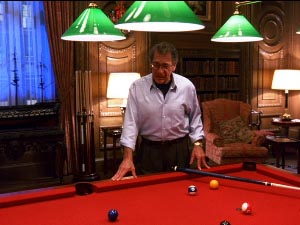 503 |
 504 |
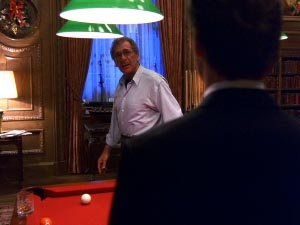 505 |
 506 |
 507 |
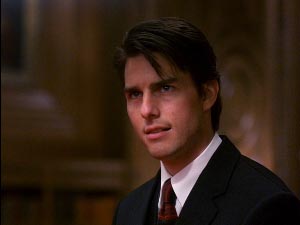 508 |
509 MS Victor. (2:13:20)
VICTOR: And I think you just might have the wrong idea about one or two things.
The paper on the table to the screen left of the ship has disappeared.
The ship is a conspicuous note due Alice's story of the Naval officer.
510 MCU Bill. (2:13:22)
Bill stares in horror, and we can hear the clock tick-tocking in the shocked silence that ensues. He drops his head, smiles, then asks what he's talking about.
BILL: I'm sorry, Victor, I, uh, what in the hell are you talking about? (He laughs.)
511 MS Victor. (2:13:41)
The newspaper to the screen left of the ship has returned.
VICTOR: Please, Bill, no games. I was there, at the house.
512 MCU Bill. (2:13:56)
VICTOR: I saw everything that went on.
513 MS Victor. (2:14:03)
The paper to the screen left of the ship has evaporated again.
VICTOR (strolling toward the ship model): What the hell...
514 MCU Bill. (2:14:14)
VICTOR: ...did you think you were doing? I couldn't...
515 MS Victor. (2:14:20)
VICTOR: ...I couldn't even begin to imagine how you, how you'd even heard about it, let alone got yourself through the door. Then I remembered...seeing you with that that that prick piano player, Nick whatever the fuck his name was, at my party...
There is nothing in the party scene to suggest that Victor ever saw Bill and Nick together when they only spoke with each other once and were interrupted, Nick being called away. But none of that really matters as Bill was at Somerton by invitation, as is made clear by the spotlight into which he steps there.
516 MS Bill leaning on the pool table. (2:14:43)
VICTOR: ...and it didn't take much to figure out the rest.
BILL: It wasn't Nick's fault. It was mine.
517 MS Victor. (2:14:56)
As Victor crosses over to stand before the fireplace we see screen right of it that an end table beside the upholstered chair is gone.
VICTOR: Of course it was Nick's fault. If he hadn't mentioned it to you in the first place none of this would have happened. I recommended that little cocksucker to those people and he's made me look like...
518 MS Bill. (2:15:06)
VICTOR: ...a complete asshole.
BILL: Victor, what can I say? I, I had absolutely no idea you were involved in any way.
519 MS Victor standing at the billiards table. (2:15:34)
The end table missing in shot 516 has returned.
VICTOR: I know you didn't, Bill, but I also know that you went to Nick's hotel this morning...
520 MS Bill. (2:15:46)
VICTOR: ...and talked to the desk clerk.
BILL: How do you know that?
521 MS Victor at the pool table. (2:15:51)
VICTOR: Because I had you followed.
522 MS Bill. (2:15:55)
BILL: You had me followed.
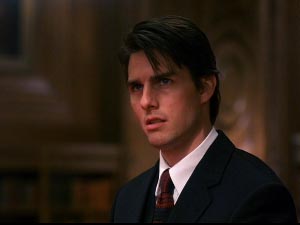 510 | |
 511 |
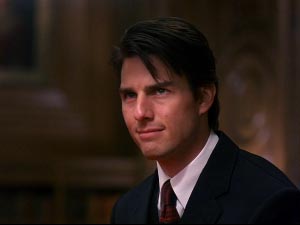 512 |
 513 |
 514 |
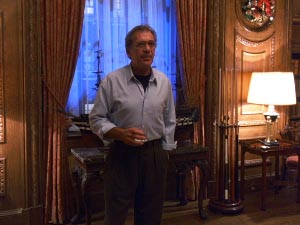 515 |
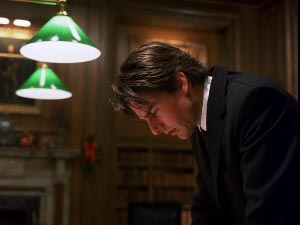 516 |
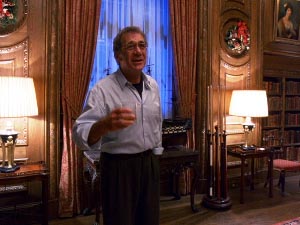 517 |
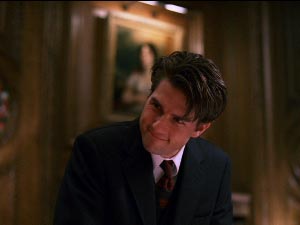 518 |
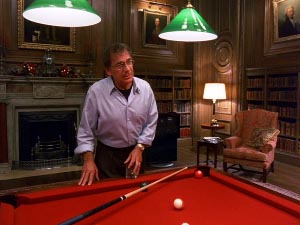 519 |
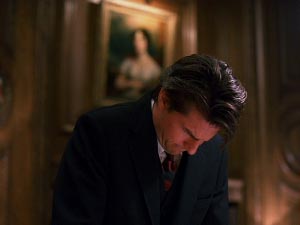 520 |
 521 |
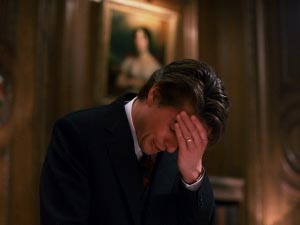 522 |
523 MS Victor.
Oops. The end table is gone again.
VICTOR: I, okay, okay, I'm sorry, all right, I owe you an apology, but this was for your own good, believe me. Now, look, I know what the desk clerk told you, but what he didn't tell you is...
524 MS Bill.
VICTOR: ...all they did was put Nick on a plane to Seattle.
525 MS Victor. (2:16:20)
And, now the end table is back.
VICTOR: By now he's probably back with his family, you know, banging Mrs. Nick.
526 MS Bill. (2:16:26)
BILL: The clerk said he had a bruise on his face.
527 MS Victor. (2:16:31)
Bye to the end table again.
VICTOR: Okay, he had a bruise on his face. That's a hell of a lot less than he deserves. (He sits on the table near Bill.) Listen, Bill, I don't think you realize what kind of trouble you were in last night.
 524 |
 525 |
 526 |
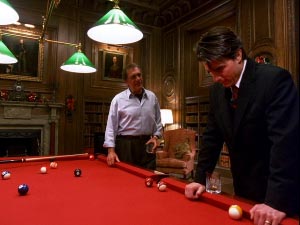 527 |
528 LS Bill and Victor at the pool table, from beyond the liquor table. (2:15:45)
Hello to the end table again.
VICTOR: Who do you think those people were?
He takes Bill's glass and goes to the liquor table. A name on a bottle facing us is Martin or Martini.
VICTOR: Those were not just ordinary people. If I told you their names...I'm not gonna tell you their names...but if I did, I don't think you'd sleep so well.
He pours another round of scotch.
BILL: Was it the second password? Is that what gave me away?
529 MS Victor. (2:17:09) He crosses back over to Bill with his glass.
Bye again to the end table.
VICTOR: Yes, finally, but not because you didn't know it. It's because there was no second password. Of course, it didn't help a whole lot that those people arrive in limos and you showed up in a taxi.
530 MS Bill. (2:17:30)
VICTOR: Or that when they took your coat they found the receipt from the rental house in your pocket made out to you-know-who.
531 LS Bill stepping away from the billiard table, and away from Victor who has seated himself beside the fireplace. (2:17:41)
BILL: There was a...there was a...there was a woman there who tried to warn me.
532 MS Victor sitting up. (2:18:08)
VICTOR: I know.
 529 |
 530 |
 531 |
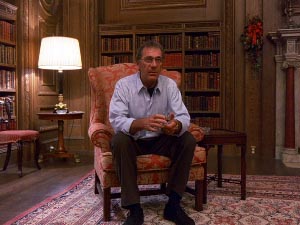 532 |
533 MS Bill with Victor in the background beyond the billiard table. (2:18:13)
BILL: Do you know who she was?
VICTOR (standing): Yes, she was...she was a hooker. Sorry but that's what she was.
BILL: A hooker.
The coffee table is now cleared. When Bill entered there were newspapers and magazines on it.
The coffee table being cleared, we see now a cup ring on it. This isn't accidental. It connects with 6 cups which will soon be observed on the table.
534 MS Bill seating himself on the sofa. (2:18:56)
535 MS Victor. (2:19:03)
VICTOR: Bill, suppose I told you that everything that happened to you there, the threats, the the girls' warnings, the last minute interventions, suppose I said that all of that...
536 MS Bill. (2:19:33)
VICTOR: ...was staged, that it was a kind of charade, that it was fake.
BILL: Fake.
537 MS Victor. (2:19:51)
VICTOR: Yes, fake.
538 MS Bill. (2:19:56)
BILL: Why would they do that?
VICTOR: Why?
539 MS Victor. (2:20:10)
VICTOR: In plain words? To scare the living shit out of you. To keep you quiet about where you'd been, and what you'd seen.
540 MS Bill. (2:20:24)
Bill slaps his hands. He brings out of his pocket the newspaper article about the girl's death and unfolds it.
 534 |
|
 535 |
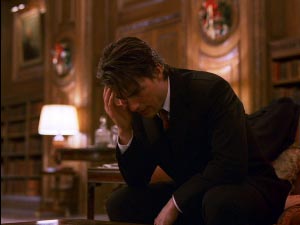 536 |
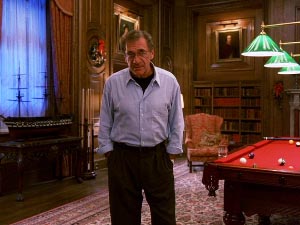 537 |
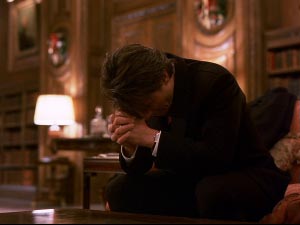 538 |
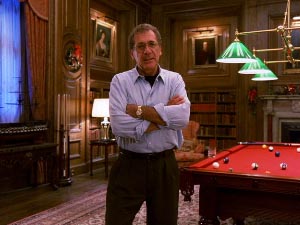 539 |
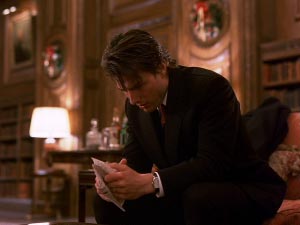 540 |
541 LS of the room, Bill in the foreground, Victor beyond. (2:20:41)
Looks like the end table is finally back. I think I spot a leg. It was gone for a while.
The 6 green cone lights over the pool table have now become 6 cups on the coffee table, anticipated by the cup ring observed on the table in shot 532.
BILL: Have you seen this?
Victor reluctantly advances and takes the paper.
542 CU the article. (2:20:53)
The paper is viewed not against the rug but backed by likely the coffee table, though positioned over the table as if Bill is holding it rather than Victor.
543 MS Victor standing beside Bill. (2:20:58)
VICTOR (folding the article and handing it back): Yes, I have.
BILL (takes the paper): I saw her body in the morgue. Was she? Was she the woman at the party?
VICTOR: Yes.
He returns to the billiard table to lean against it.
544 CU Victor. (2:21:37)
VICTOR: Yes, she was.
545 MS Bill. (2:21:40)
BILL (stands): Victor, the woman lying dead in the morgue was the woman at the party.
546 MS Victor. (2:22:00)
VICTOR: Yes.
547 MS Bill. (2:22:04)
BILL: Well, Victor, maybe I'm missing something here. You called it a fake, a charade, do you mind telling me what kind of fucking charade ends with somebody turning up dead?
548 MS Victor. (2:22:27)
VICTOR: Okay Bill, let's let's let's lets let's cut the bullshit. All right? You've been way out of your depth for the past 24 hours.
549 MS Bill. (2:22:41)
VICTOR: You wanna know what kind of charade? I'll tell you exactly what kind.
550 Victor. (2:22:43)
VICTOR: That whole playacted, take me, phony sacrifice that you've been jerking yourself off with had absolutely nothing to do with her real death. Nothing happened to her after you left that party that hadn't happened to her before.
551 MS Bill. (2:22:57)
VICTOR: She got her brains fucked out, period.
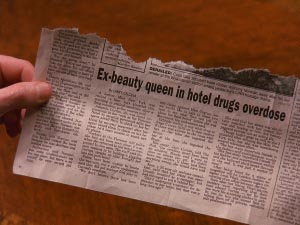 542 |
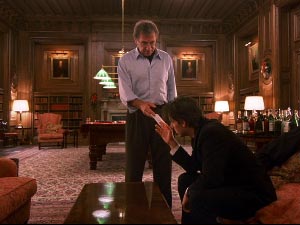 543 |
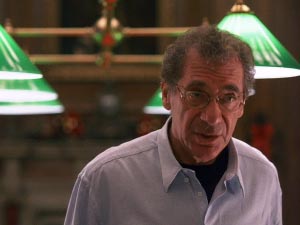 544 |
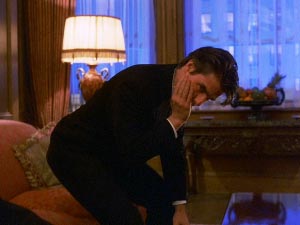 545 |
 546 |
 547 |
 548 |
 549 |
 550 |
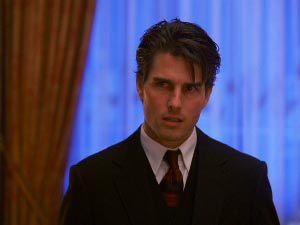 551 |
552 LS Victor from behind Bill. (2:23:00)
VICTOR: When they took her home she was, she was just fine. And the rest of it is right there in the paper. She was a junky. She OD'd. There was nothing suspicious. Her door was locked from the inside. The police are happy. End of the story.
553 MS Victor. (2:23:18)
VICTOR: Come on. It was always going to be just a matter of time with her. Remember, you told her so yourself. You remember, the one with the great tits who OD'd...
The news report mentioned "just a matter of time". Amanda's sister was quoted as saying, "She has many important friends in the fashion and entertainment worlds and she believed she'd break through in the end. It was just a matter of time."
554 MS Bill. (2:23:28)
VICTOR: ...in my bathroom.
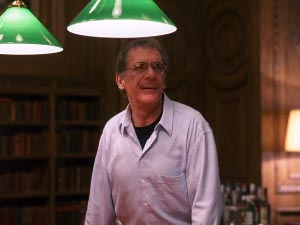 552 |
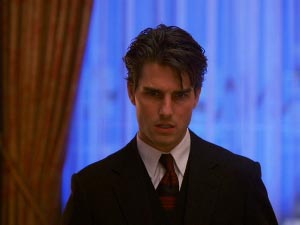 554 |
555 LS Bill and Victor. (2:23:33)
Bill turns away.
I've been amused by the couch on which Bill was sitting. It's a peculiar mess in these shots. The cushions on the one opposite it and the chairs are fine. But the cushions on that couch are a flat mess, as if they are filled with only a few feathers rather than anything sturdier.
VICTOR: Listen, Bill, nobody killed anybody. Somebody died. It happens all the time.
Victor claps his hands in a buddy fashion on Bill's shoulders, from behind.
VICTOR: But life goes on.
VICTOR: It always does. Until it doesn't.
VICTOR:(Laughs.) But you know that, don't you.
In the screenplay, Victor instead describes Amanda thusly:
Bill, are you so sure she was the kind of woman for whom the things you imagined were actually a sacrifice? If she attended these affairs and knew the rules so well, do you suppose it would have made any difference to her whether she belonged to one of the men, or to all of them? Bill, she was just a thousand-a-night hooker, no more, no less.
Before I move along, I'd like to note that Amanda's death by OD, rather than a murder, is given as proven by her door having been locked from the inside, a fact which wasn't in the newspaper article which means that Victor has privileged information, and Kubrick has scripted it so that the audience is aware of this and Bill likely is as well or else Kubrick wouldn't have the conversation halting immediately after.
The Shining had the scene in which Jack was locked in the storage room (pronounced story room at one point) and then is released by what may be a supernatural force. Much has been conjectured about whether he was released by the supernatural or if there is a rational answer. We've here another such mystery, the how of Amanda's death given as confirmed entirely by that door being locked on the inside, Victor insisting that this proves her death was accidental. The viewer is left to judge whether or not Victor can be trusted, if this bit of privileged information he has on her death means it wasn't entirely accidental.
This scene in Victor's billiards room is 13:62 minutes long, nearly as long as the confrontation between Bill and Alice, which was 14:61 minutes long. The bulk of it is conversation, and not much to add to or distract from the dialogue. That's near epic length for a scene like this in which so little seems to occur other than dialogue, Victor revealing to Bill he was at the party, he was the one who had him followed, and the events were staged for his benefit.
The acting is so understated that there's much about Cruise's performance we may not notice, such as the subtle changes in facial expression at the end. When Victor reveals the prostitute was Amanda, Bill turns away his hand to his mouth, but whether or not it's in response to learning the prostitute was Amanda, or Victor's reveal that the door was locked from the inside, we don't know. Victor says, "Somebody died, it happens all the time," and claps his hands on Bill's shoulders from behind, Bill starting forward slightly, perhaps feeling the threat of death, his own mortality. "But life goes on," Victor says, Bill staring at the ground, his mouth slightly open, the weight of Victor's hands on his shoulders. "It always does, until it doesn't," Victor adds. And Bill's face twists with a slight grinning grimace. "But you know that, don't you," Victor laughs, Bill's expression subtly changing yet again.
Bill's expressions have been throughout a peculiar mix. In the taxi, as he's thought about his wife with the naval officer, his face has been flat, largely devoid of expression. So, too, as he's made his way around the Village have his emotions been largely internalized. When he did express rage and frustration, slapping his hands, he was immediately thereafter accosted, and again withdrew. Mixed with this we've had also the bulldozing confidence in his encounters with Nick, at the Rainbow as he sought a costume, and later in his attempting to make inquiries, but how much was veneer. There have been moments of shock and surprise, but restrained. This is about to change when he confronts his mask that is waiting for him at home.
Now to address the torn newspaper.
One day I was looking for something other and came across this in Google images.

I had already written in my analysis on Eyes Wide Shut that, knowing how Kubrick works things, I felt there was something extra going on in that Somerton cab scene when Bill tore the money in half, and that there was perhaps a kind of half-way point being suggested. Not that it takes much to be aware of this. Kubrick simply developed a certain economy of language over the years and tended not to waste words. So Bill's stunt with the cab driver, an aside that took up undue screen time without seeming to contribute much to the story, was a red flag that there was likely more to be had here than met the eye and ear. Below is how I phrased it.
He's still gaming here, the way that Bill handles the cab driver. He hands him $80, which is only $5.50 over the meter. But Bill had promised $50 over the meter. He pulls out a $100 and tears it in half, making his proposition that the driver wait for him and receive a full century note. He brandishes his big smile, selling the idea, brimming with confidence, too, that the money and his smile and his charm will make the sale.
Kubrick's having Bill tear the 100 dollar bill in half again works in with the idea that we're at a "center" here, a dividing line, such as the center of a maze, as I've discussed in the previous section.
The image of Bill tearing the bill, imposed over when Bill takes out the torn article on the woman's death from his pocket, caught me. I followed the image from Google over to Reddit, where an individual named Zac had written the following:
I think I have made the greatest discovery about Eyes Wide Shut. When split in two at the right place and played at the same time, the two parts make a new movie. The split around 1:07:22 is the moment Bill carries a paper cut in half on both sequences! (a dollar bill and a newspaper)...Here's what I did...You can do it yourself for a 2:32:31 version.
A. 00:15 to 1:07:22 (the Warner Bros logo must be removed)
B. 1:07:22 to the end.
At the end of B in the sequence 2, you have to put A directly at the beginning again at 00:15.
Zac has indeed made an interesting discovery that I can, as it turns out, co-oberate.
Zac had kindly put up the overlay (in 2 parts) on Vimeo. (Thank you, Zac, for that work!) You can see in his "part 1" where we end up having the shot of Bill tearing the bill superimposed over Bill taking the torn newspaper article from his pocket. It occurs at about 1:07:36.
Eyes Wide Open (part 1) from zak be on Vimeo.
What's happening is Zac is simultaneously running EWS from its normal beginning (minus the logo) and the 2nd "beginning" he establishes as occurring when the cab arrives at Somerton, followed by Bill tearing the $100 bill, giving half to the driver and promising him the other half if he waits for him.
The speed of Zac's film is faster than my copy of Eyes Wide Shut. His film is 2:32:31 minutes long whereas mine is 2:39:03, but as long as the film is split in the right place and the opening logo removed then one with the slower film speed would still match Zac's experience.
Responses to Zac's post on Reddit at first included "complete hogwash", "the feverish scribblings of a madman", "bizarre conspiracies and over analysis", "you sound like a fucking kook". But some people were interested and there were those simply found it entertaining.
Not just any film will internally cross-reference in a way where syncs with overlays like this are possible, but it does happen with Kubrick. Much of this is due the way he works with themes, symbols and framing, so it's going to be difficult to tell, of Kubrick's art, what overlay syncs are coincidental and what are perhaps intentional, as some purport--as with Zac's method, or John Fell Ryan's overlaying of The Shining and the syncs he gets with a backwards running superimposition. But...
Kubrick does play with shot numbers in his film conveying meaning. I have numbered the shots in EWS and here's what we have that supports Zac's thesis. Shot 268 is when the cab pulls up, we viewing from inside the cab. The Somerton sign is shown to the screen right of the entrance to Somerton. In shot 269 we have a LS of the cab and the Somerton sign is now on the screen right of the entrance to Somerton. In shot 270 Bill has his exchange with the cab driver. He gives him half of the hundred dollar bill and promises him the other half when he gets back, which may be in ten minutes or an hour.
Now, let's jump forward to the scene at Victor's and the shot when Bill pulls the torn newspaper clipping out of his pocket. The shot number? 540.
270 (when Bill tears the century bill in half) plus 270 is what? 540.
That's the main thing, and would be "Wow" if purely coincidental rather than planned. Kubrick, I believe, did something very similar in The Shining so I'm inclined to believe it is intentional.
This halving of the film in this manner at Somerton's gate makes some sense of Kubrick moving, at that point, the Somerton sign from the right of the entrance to the left, just as in 2001 when we have our first flip horizontal of the screen backdrop in shot 55 when the hominids first gather around the monolith. We've seen this screen backdrop a couple of times before, then Kubrick reverses it when the monolith appears. We fully comprehend visually his sensibility when in shot 595 we have the final zoom in on the monolith from Bowman's POV on the bed, the room becoming more symmetrical as we close in on the monolith.
In shot 539, the coffee table before the sofa is clear of any reflection.
In shots 541 and 543 (Victor receiving the news article and returning it to Bill) we have a high shine reflection of the 6 lights overhanging the billiards table.
This has long stood out to me, and it seems to me the appearance of the reflection can serve to symbolize the reunification of the split bill. It's a variation onf the flip horizontal mentioned above.
Below are some of my own observations of seemingly meaningful alignments caused by the overlay:
In the Zac overlay, in Part 1, from the beginning of the film to the end of Victor's party is approximately the same as Bill's time at Somerton.
At 24 seconds, when Bill is tearing in half the 100 dollar bill for the cab driver, Alice is slipping off her black dress with the split tail in her dressing room.
Bill has put up his wallet in his pocket in the cab when he asks if Alice has seen his wallet.
Bill has put on his coat and is adjusting it, saying goodbye to Helena and the babysitter, and in superimposition at Somerton he is removing his coat. He and Alice exit and enter Victor's party at the same time Bill at Somerton enters the area of the hierophant and the women in the circle. As I've stated earlier in the analysis, the painting in the living room that we see behind the tree is done of the grounds where the parking lot of Somerton was shot.
Victor is introduced as we first see the hierophant. Victor's speaking of his serving arm perhaps fits in with the hierophant holding the long cane in his left hand.
There is a black drapery on the floor behind the Christmas tree at Victor's party. I always thought this referred to the black cloaks. It superimposes over the bowing women in the black cloaks in the circle at Somerton.
Nick playing piano at Victor's party is briefly superimposed over Nick playing at Somerton.
When the black-feathered woman is being led up the stairs away from Bill and nods at him, Alice is noticing Bill speaking to the two models at Victor's ball and nods at him simultaneously.
Bill's gold mask beautifully blends in with the Christmas lights at Victor's ball as Alice informs the Hungarian he's her husband.
When Bill asks Nuala and the other model, "Now ladies, exactly where are we going?", he is immediately asked at Somerton, "Do you want to go somewhere more private?" And then he is told he is being taken to where the Rainbow ends. He is standing between the two models at Victor's ball, Victor's aid coming to take him away, at the same moment that the black-feathered woman at Somerton asks to borrow Bill from the other woman who had proposed they go somewhere more private.
Bill is touching Mandy's face in the bathroom at the exact moment that Bill attempts to remove the black-feathered woman's mask, his hands reaching too aggressively to her face (which I always thought was a very odd move that made no sense to me, but it does make sense with the superimposition).
When he asks Mandy to open her eyes for him in Victor's bathroom, Bill is simultaneously returned to the great hall at Somerton and he realizes he's in trouble. While he is repeatingly telling Mandy to look at him (having observed she can see him), we have numerous close-up superimpositions of the various masks, which is suggestive of the many masks Bill wears.
Just after Bill has been told to remove his clothes, and the black-feathered woman interrupts, in the superimposition Victor asks if he can get some clothes on Mandy and get her out of there, and Bill tells him to keep her there another hour (16:57).
The hierophant tells Bill he is free as Alice realizes how drunk she is and pulls away from the Hungarian, saying she has to go.
Shot 56 of the painting (from the hallway, now in the bedroom) is superimposed over shot 362 with the same painting returned to the hallway as Bill arrives home after Somerton. This in particular strikes me as important in determining this superimposition based on the scene of the "halving" of the bill is not accidental.
When Alice is waking then telling her dream to Bill, she is also smoking weed with him in their bedroom, dressed in the same one piece body chemise in both scenes (this dream scene ends while the earlier bedroom scene continues on).
When Alice says to Bill, "Tell me something," Bill in the other section immediately follows with beckoning Alice, "Tell me," about her dream.
Bill asks her who she was dancing with (the Hungarian) as she describes in her dream the naval officer staring at her.
"He was a friend of the Ziegler's," Alice says of the Hungarian. This is superimposed with, from the dream section after Somerton, "He was the man at the hotel, the one I was telling you about."
Jason hotel. "Did he leave a forwarding address?" Bill asks. At the same time Alice is telling about the Naval officer receiving a message and being called away.
While Alice tells her story about seeing the officer in the lobby at the hotel, Bill is speaking with the clerk at the Jason hotel.
Alice says she realizes the officer was gone at the same time Bill, at Rainbow Fashions, says he must have lost the mask.
The owner of Rainbow Fashions asks his daughter if she wants to say hello to Dr. Harford at the same time that Bill gets the Nathanson call and says Hello.
At shot 405 Rainbow fashions tears up Bill's deposits. With Alice, Bill says Lou Nathanson just died. I note the shot number as it is at shot 540 that Bill pulls out the torn newspaper article, the number for that shot doubled from shot 270 when he tears the $100 bill in half.
Bill arrives at the Nathanson residence and is let in by the maid at the same time his secretary/receptionist enters his office with his lunch so we've an overlapping of the two women.
At Somerton again, Bill looks up at the security camera looking down at him at the same time he looks down at Lou Nathanson's dead form and touches him.
The studying with the Carlos math books in the Harford dining room briefly overlaps with Carl Thomas, the math professor, arriving at Marian's after her father's death.
Bill calls Marian's from his office and Carl answers the phone, superimposed directly over Carl standing between Marian and Bill during the earlier visit as Bill says he's leaving. Bill exits the Nathanson's and hangs up the phone at the same time.
Bill sits down in Domino's kitchen with Domino at exactly the same time he sits with her roommate.
Can I offer you anything, a cup of coffee, said by Domino's roommate syncs with the waiter serving Blume in the movie Alice is watching.
Bill becomes aware he is being followed at the same time that Alice calls.
Was that Mrs. Dr. Bill is said by Domino at the same time Bill and the bald man have their "meeting", Bill rushing to stand before the newsstand.
Bill has a beer at the Sonata at the same time he's at Sharky's.
At the hospital, Bill refers to Mandy as a patient about the same time he tells Nick that what brought him out that night was a patient.
Bill, at the Sonata, asks Nick, "What's the big mystery?" at the same time as he views the woman's body at the morgue.
Nick writes down FIDELIO as we see Bill pull back from the woman below locker 19. She is in locker 10 at the morgue.
Immediately after Nick gets his call at the Sonata, Bill gets the call from Victor as he leaves the hospital.
As Bill, in Victor's billiards room, tells Victor it was a terrific party, Nick tells Bill that everyone is always costumed and masked.
Victor says he didn't know how Bill got himself through the door as Bill enters Rainbow Fashions.
The superimposition of Bill tearing up the $100 bill with the cabbie at the same time Bill removes the torn newspaper article from his pocket at Victor's. And Victor takes the newspaper article as the cabbie takes the 1/2 of the $100 bill.
In part 2, when Bill is hiding the mask in the credenza in his office (which wasn't there earlier), he and Alice, entering Victor's party, are passing by a case pressed up against a door. So that Bill in the superimposition could be taken as putting the mask in the case.
As Alice is telling Bill about the naval officer who in her dream walked out of the woods and stared at her, the camera has turned to the Hungarian at Victor's party who is staring at Alice.
At 12:53 when Bill is asking the hotel clerk if he noticed anything unusual, in superimposition as he examines Mandy in Victor's bathroom he appears to be holding his own eye open at the hotel's registration desk.
At the same time that Bill is looking askance at the Japanese men leaving Rainbow Fashions (about to question why the owner didn't call the police), Victor is in his bathroom asking Bill to keep what happened to Mandy a secret, to not tell anyone, and he readily agrees.
At the ball, Alice is saying she has to go, and Bill is telling his receptionist to come in at his office. Strikingly, when Bill holds up his hand, so does Alice, to show her ring and that she's married.
Bill has just left Lisa and the office and arrived at Somerton (where he will receive a message) when in the overylay he exits the elevator into his office and says good morning to Lisa and gets his mail.
Alice opens the bandaid box and removes the weed at the same moment Bill opens the envelope at Somerton's gate and reads the message to him.
During their bedroom argument, Alice stands in the bathroom doorway and says because she's a beautiful woman that's the only reason any man wants to talk with her is to fuck with her, is that what he's saying? Superimposed over this is Bill, in his office, calling Marian on the phone. Back in the bedroom, Bill says he doesn't think it's quite that black and white as we see the black telephone in the bedroom, then the black telephone in the foyer at the Nathanson's. (In the opening of the film, the phone in the bedroom is white and changes to black in this scene.) Bill hangs up his black phone at the office as we are seeing again the black phone in the bedroom.
Bill is saying he would never lie to Alice or hurt her as he enters Domino's building the second time.
Alice's monologue about Bill examining the breasts of his female patients is followed by Bill fondling the breasts of Domino's roommate.
As the bald man following Bill walks away, Alice remarks, as to the naval officer, that she had woken up to find he was gone and she was relieved.
Bill gets the call telling him Lou is dead at the same time he opens his paper with "Lucky to be Alive" on the cover. "I'm going to have to go over there and show my face". Bill's face is superimposed over his own.
Bill enters the front revolving door of the hospital at the same time he enters the foyer to the Nathanson apt and approaches its door.
As Amanda's body is pulled out at the morgue, Bill advances to the death bed of Lou Nathanson and touches his head.
UNMASKED
THE MASK ON THE PILLOW AND HOW IT COMES TO BE THERE IN THE SPATIAL/PSYCHIC LOGIC OF THE FILM -- BILL AND ALICE'S APARTMENT AND THE SHIFTING POSITION OF THE BEDROOM
556 CU Bill's mask on his pillow. (2:24:06)
Cut to Bill's mask on his pillow, Alice asleep beside it. The pillow is depressed beneath the mask, even more so than the pillow is depressed beneath Alice's head. The cushion on the couch beside Bill at Victor's had also been flattened as if it had scarcely any stuffing at all.
The Musica Ricercata #2? plays.
Before Bill even arrives home, we are greeted with his mask lying beside his wife in bed, on the pillow. We had seen Bill take the Rainbow bag, supposedly holding his mask, and hide it in the cabinet in his office, and lock it, yet when he took the bag to the Rainbow there was no mask. Never mind for the moment the cabinet didn't exist in an earlier shot, the puzzle of how the mask was removed from the locked cabinet is on par with the puzzle of how Jack escaped from the locker in The Shining, and Victor's knowledge that Amanda's apartment had been locked from the inside.
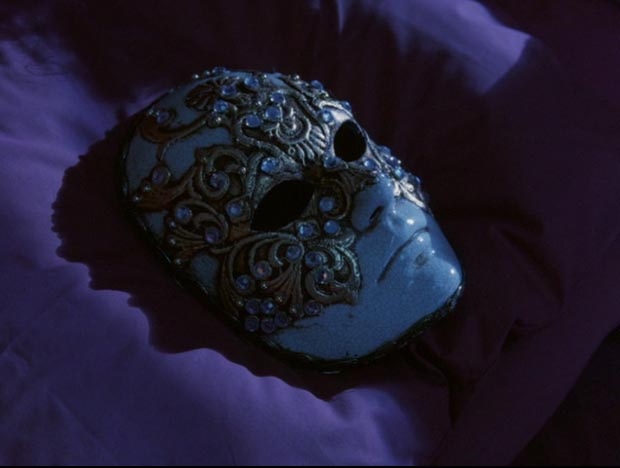
557 MS The entry hallway of the Harford apartment. (2:24:19)
Bill enters the apartment. We see its number, 5A, and the fleur de lis decoration on the blue hall wall outside. He passes by a hall between the entry and the living room and looks left, as if checking to see if anyone is down there. He has done this before, when he was returning home from Somerton. Though we have been given reason to believe, from the opening scenes of the film, that the master bedroom is on the same hall as Helena's, Kubrick has also placed it here.
Indeed, if one gives some thought to the apartment, how the master bedroom, the dressing room and master bath fit in, the suite is impossible to place.
In an interview, Nicole said that not only did Kubrick design the Harford home so that it was an exact duplication of his apartment before he left New York for England, even the furniture, but after its decoration he had told her to add things from her own home to the bedroom to make it feel to be her own. I would suppose this was the apartment they were living in at 84th and West Central Avenue when filming of 2001 was begun, as by the time it opened they were in a mansion (I read) and then they moved forever to England after some years of a transition begun during Lolita. It seems a stretch to say the apartment would have been decorated as one in the 60s had been, down to the furnishings, but perhaps to the degree that the 90s permitted and wouldn't look odd. As a legend though, maybe with some element of truth, Kubrick's giving the bedroom no fixed place and encouraging Kidman to personalize it is interesting. If Nicole and Tom believed this story to be absolutely true then their characters were effectively, for them, living in the director's space, and one wonders what that did to their performances. And for Kubrick, if this is partly true, he would have been returned to a very personal geography and perhaps memories of 2001. This would have mixed with childhood memories, as his father was a physician.
If the apartment is based on the one in which they still had while filming 2001, it was a penthouse, so the fact that there are windows north, south, east and west makes sense, but the number of windows don't make sense according to the logic of the building in which the Harford's are living, as observed in shot 7. That building is massive, they are on the 5th floor and would not be occupying its entirety.
Why does it at all matter, even the slightest bit, that it seems impossible to orient the Harford's bedroom in relationship to the rest of the apartment? Well, it matters because first Kubrick indirectly says where it should be. It matters because every other room we are shown of the apartment--the living room, the dining room, the kitchen, the halls, the office, Helena's bedroom--are all explicitly placed, we are shown the Harfords entering or exiting these rooms without cut-away shots so we know exactly how these rooms are positioned in relationship to each other.
Yet the Harford's bedroom, arguably the most important area of their apartment, where most of the action in the Harford apartment takes place, the domestic heart of the film, is never given that same explicit orientation. The camera never follows them from another area of the apartment into the bedroom. Instead, there is always a cut-away, and then we are shown only a tiny bit of hall outside their bedroom door when the bedroom is exited or entered.
It matters because Kubrick seems to place the bedroom in one place (never mind how impossible an arrangement that may be) and then changes it so that when Bill returns home he never checks the bedroom suite's entrance that is supposed to be on Helena's hall. He instead checks a door off the hall between the entry and the living room.
Kubrick purposefully disorients the viewer, even if we're unconscious of it, even if we accept what we are shown, what we are supposed to believe, because the Harfords are at ease with their apartment, just as the Torrance family is at ease with the Overlook Hotel which abounds with impossible geographical relationships. Indeed, the viewer is intended to believe what is suggested as being real (no matter how irrational), and then Kubrick tosses in irritants that grate the flesh of the snail in its shell. If the viewer is not at all consciously aware of some disorientation, Kubrick makes certain to show us we should be questioning what's going on with the bedroom by having Bill check on the door off the hall between the entry and the living room, something Kubrick need never have had him do, and he has him do it not just once but twice.
A more exhaustive post on this, with comparisons to other films of Kubrick's, is here.
Bill removes his coat, enters the living room with its lit tree, presents all around. He cuts off the lit tree.
He goes into the kitchen. Takes a beer from the refrigerator and sits at the table.
A fault which seems to launch him into the flood of signs and adventures is perhaps his forgetting of the name of Roz or, conversely, having been made aware of it, which is going to be in respect to his failure to really see his wife, to look at her, which has to do with the world at large and his own complex nature. RZ is "to attenuate" to hide, a mystery, secret. Roz is his babysitter's name, the one for whom he's left the numbers on the refrigerator. Rosa is the name of the Nathanson maid. His experiences on the street beginning at the time of his seeing the couple kissing before the "Nipped in the Bud" florist shop, under the closed rosebud, one could think in terms of matters sub rosa. By the time we reach Domino's apartment, the flood of signs well under way, we have "maid's day off", the place a mess of dishes and old food. At the costume shop we can see across the way the sign Eros, and though there are historical warpings, present day myth has, according to Wikipedia, Aphrodite giving a rose to her son, Eros, who presents it to Harpocrates, a god since associated with silence, "to ensure that his mother's indiscretions (or those of the gods in general...) were kept under wraps".
Bill twice uses his refrigerator (on which the numbers for Roz were said to be left by him), he is the only one who is observed using the refrigerator, and each time he takes from it a Bud (Budweiser beer): when he is observing Helena and Alice do math; when he returns home from his discussion with Victor, becomes drunk, then promises to divulge everything to Alice. Perhaps the Bud can be taken as referring back to the idea of "Nipped in the Bud" had with the florist shop, and the image of the budless flower in his office. Only now does he at last get good and drunk and break down.
558 MS The bedroom door from the interior. (2:25:50 begin crossfade, end at 2:25:52.)
Bill opens his bedroom door, looking pretty inebriated. The camera does a quick pan to the mask on the bed. He stares, shocked.
559 MCU Bill in the doorway. (2:26:09) He stands frozen while undoing his tie.
560 MS The mask and Alice. (2:26:14)
561 MCU Bill in the doorway. (2:26:18)
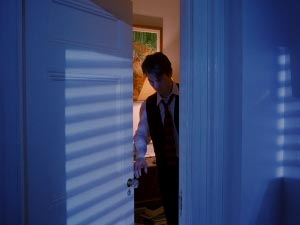 558 |
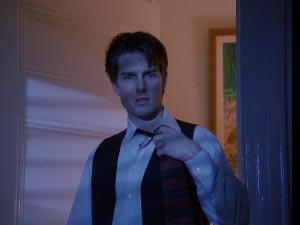 559 |
 560 |
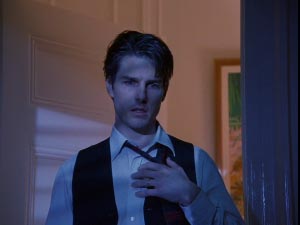 561 |
562 MS The mask and Alice from above. (2:26:29)
Alice's face has a mask-like quality.
Bill's mask casts a profile shadow.
The audience supposes that Alice, the previous morning, was aware of Bill's hiding of the rainbow bag and removed the mask with the intention of later confronting him with it. Or had Bill placed the mask in his coat pocket and Alice had found it there?
563 MCU Bill sitting on the bed. (2:26:38)
564 MS The mask and Alice. (2:26:45)
565 MCU Bill. (2:26:49)
He begins to sob.
 562 |
|
 563 |
 564 |
566 MS Alice and the mask. (2:26:58)
His crying wakes Alice, whose expression is at first bizarrely inscrutable, mask like, distant, devoid of any emotion, even surprise.
567 MCU Bill. (2:27:10)
He leans down and rests his head on her.
BILL: I'll tell you everything. I'll tell you everything.
Only after the extinguishing of the multi-colored Christmas tree lights do we have this break down with Bill offering to tell Alice everything.
As to the *how* of the mask resting on the pillow. It has been there all along, at least in the logic of the movie. The first time we saw Bill's office, the second night after the party, there is no cabinet against the right wall in his office beyond the living room. Instead, there is an easy chair and something in the corner that is taller than the chair rail.
Then, later that same night (early in the morning), when Bill returns home from the "orgy", he places goes to the office where there in place of the tall cabinet and the easy chair there is now a long, low cabinet, the top of which is just below the chair rail. He first approaches the cabinet by bending over it and touching it, rather than crouching.
He removes an accordion folder from the cabinet, ostensibly making room for the bag, which he then tucks into the cabinet and locks it.
As Bill is placing the bag in the cabinet, Kubrick begins a crossfade to the bedroom.
The crossfade merges the cabinet with the headboard of the bed and has Bill, in effect, placing the bag holding the mask on his bed. Note how the lines of the folder atop the cabinet form also a kind of duplicate headboard in conjunction with the corner of the room fading in.
The perspective lines of the folder fit in with the headboard of the bed and the picture frame.
The perspective lines of the cabinet fit in with the perspective lines of the shadows from the blinds.
Here we see the crossfade completed.
The camera now pulls back as Bill comes around the bed. Rather than simply lowering himself and sitting upon it, his actions replicate those in the office, as he approaches the bed by bending over it, placing a hand upon it. The thing is, he didn't have to bend over the cabinet, place his hand on it, then crouched before it. He could have simply crouched before it. Again, in the bedroom, he didn't have to first bend over the bed and place his hand upon it (as he had done with the cabinet), he could have simply sat down. The connection with him before the cabinet is being reinforced. Compare with the crossfade and he has been placed approximately in the same area as Bill in the office within the frame of the bedroom door.
He then seats himself and Alice awakens.
When Bill enters his room the third night, he sees the mask on the pillow.
The night when Bill had returned home from Somerton, it was Alice who woke from a dream and cried with the recounting of it, and it's easy to forget that, how it links in with this, and her role in this whole affair. Which began with the smoking of the mj from the band-aid box and her recounting her almost abandoning her entire life for the mysterious naval officer, who was called away, for which reason she was never actually "tested" and so never discovered whether she actually would have had the affair or not, though she believed that she would have given up everything for one night.
Then, when Bill is at the mysterious, other-wordly Somerton, reached through the underworld, through Nathanson's death, and the Oyster Bay funeral home, Alice seems to share in some bit of that with her dream of the naval officer, who she knew was the same though he looked to be a different person, and with her making love to so many men she can't begin to count them. In the screenplay's dream, Bill is the sacrificial Christ figure in Alice's eyes, threatened and tormented, and she disdains him for it and laughs in his face. In the movie, it's simplified, so that instead she scorns him and laughs in his face while making love to the other men. Alice's dream role is much like how Victor describes Amanda to Bill in the screenplay, saying, "Do you suppose it would have made any difference to her whether she belonged to one of the men, or to all of them? Bill, she was just a thousand-a-night hooker..."
Bill, in the screenplay, realizes, when he looks at the corpse in the morgue, that he had been imagining her as having his wife's face.
Alice describes herself, in the screenplay, as being far more beautiful in her dream than she ever was in reality, which again places her as one of the women at the other-worldly party. Just as the Naval Officer appeared different but she felt him to be the same man, we have confusions of appearance, such as with the stunningly beautiful women in their masks, such as with Bill being unable to tell who the woman in the morgue was, such as with Kubrick intentionally confusing issues by using two women to play Amanda, and having Amanda play more than one role, so that at Somerton it is in effect Amanda (Abigail) who interrupts and takes Bill away from Amanda just when he has consented to go to a more "private" place with her.
Amanda-Abigail Good, when she takes Bill from Amanda, promises to bring him right back. Later when she announces she will redeem him, and Bill inquires what will happen to her, he's told, "No one can change her fate now. When a promise has been made here, there is no turning back. Go!"
But she had promised to return him as well. That's curious, as we seem to have had two promises made at Somerton. Or was it only one? Continuing in the vein of so many things being "nipped in the bud", "Amanda" interrupts the possible laison between Bill and the woman sent to him by the individual who seemed to be Victor. The woman had asked if Bill wanted to go someplace more private, reminding of the private office at the Rainbow. Amanda steps in and promises to bring Bill right back, to return him. This neatly folds in actually with her promising to redeem Bill for to redeem means to buy back, to take back (also to ransom). She doesn't say she promises to redeem him. She at first says she promises to bring him right back and then states she will redeem him in the theatrical.
tl;dr. Anything I really need to know about?
How the mask on the pillow comes to be there according to the spatial/psychic logic of the film.
Approx 12.800 words or 26 single-spaced pages. A 98 minute read at 130 wpm.
Next: Eyes Wide Shut Analysis - Part 9
Go to Table of Contents for Analysis of Eyes Wide Shut
Link to the main TOC page for all the analyses

